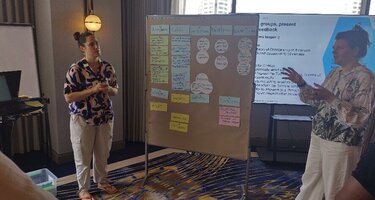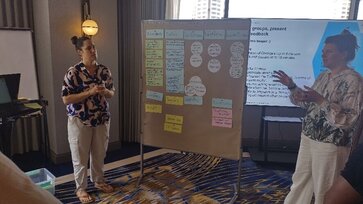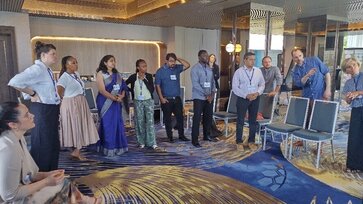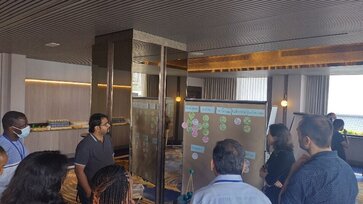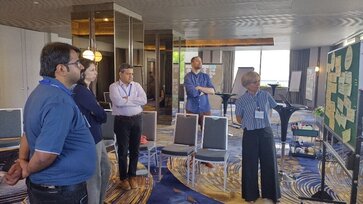From Project to Long-term Impact: How Fit4Scale Empowers Implementation Partners in Scaling
Why Scaling is not a checklist and how Fit4Scale empowers implementation partners to realize their impact
Impact at Scale - Everyone is Talking About It. But What Does It Actually Mean?
"Scaling" is ubiquitous. There is hardly an innovation project in which scaling does not eventually come up. The common understanding of scaling involves more money, more people, more countries, greater reach, increased impact, and enhanced sustainability. Often, scaling is interpreted as "more of the same," meaning rapid growth or the standardized rollout of a model. However, it is worthwhile to distinguish between two fundamentally different approaches: transactional scaling and transformational scaling.
Transactional scaling follows the aforementioned approach: increasing budgets, expanding to more locations, and reaching more users. The focus is on the short-term outputs of individual projects. In contrast, transformational scaling considers systemic frameworks and the actual problem. This approach allows the gradual addressing of root causes, the creation of favorable local conditions, and the achievement of long-term impact. It adopts a systemic perspective, viewing projects as intermediate steps on the path toward sustainable change.
Additionally, a distinction can be made between "large" and "optimal" scale. Large scale considers results relative to the size of the problem. For example, improving the livelihoods of 10,000 beneficiaries in Malawi may be significant, but the same results in India may not be considered relevant. Optimal scaling, on the other hand, considers the trade-offs between reach, quality of impact, sustainability, justice, and human rights.
Scaling: Many Talk About It – And More and More Are Acting on It
The growing emphasis on scaling in the agricultural sector is also evident in the systematic attention that leading actors are giving to the approach. In addition to the FAO and the Scaling Community of Practice, the CGIAR also plays a central role with its extensive innovation portfolio and a new Scaling for Impact Program. It is the first CGIAR program entirely dedicated to scaling innovations in the areas of food, land, and water.
The Scaling Scan, a practice-oriented analysis tool developed by CIMMYT, supports teams worldwide in systematically examining their innovations for scaling potential. The German Federal Ministry for Economic Cooperation and Development (BMZ) has also published the Scaling Toolkit (2024), a profound and practical tool for scaling (digital) innovations in international cooperation.
Against the background of the above-described development and based on the growing importance of scaling innovations in the agricultural sector, the Fit4Scale capacity-building format was developed. Considering the innovation portfolio of the Fund for the Promotion of Innovation in Agriculture (i4Ag), which includes over 40 innovations in approximately 55 countries, i4Ag has a significant interest to systematically anchor and further develop those innovations in a sustainable manner with its implementation partners. Fit4Scale combines the conceptual foundations of the Scaling Scan and the Scaling Toolkit with an interactive learning process. Therefore, it is the answer to the need to not only provide tools, but also to develop them in a targeted manner.
Fit4Scale: The Language Course for Scaling
Unlike the Scaling Scan, which functions as a diagnostic tool akin to a language test that provides initial insights into scaling an innovation, Fit4Scale is better understood as an interactive language course for scaling. It is a learning environment in which teams acquire the necessary mindset, competencies, and tools for the responsible, context-specific, and impact-oriented scaling of their innovations. The goal is to empower innovation teams to design and further develop their own scaling strategies and collaboratively with their partner organizations, based on sound methodologies, but primarily on their own expertise and the needs of their ecosystem.
In November 2024, about 20 participants from 12 i4Ag innovations gathered for the first online session. The topic: understanding the target audience. Three subsequent online sessions took place in November and December 2024. During these sessions, an updated Theory of Change and a stakeholder ecosystem map were developed, and scaling visions and pathways were defined. A particular highlight was the intensive, one-week, in-person workshop in Bangkok, also called Scaling Sprint, in March 2025, which received positive feedback. Implementation partners from various i4Ag innovations came together to learn, discuss, and collaborate across disciplinary and regional boundaries. Each team aimed to craft a scaling strategy, enabling them to independently take concrete steps and iteratively refine their strategy in partnership. The evaluation revealed that participants believe in the value of Fit4Scale, as reflected in the following quotes:
“The training led us to deeply evaluate our own scaling journey and processes and forced us to really challenge and interrogate our approach. Which for me was a big win.”
“I am glad that I was given the tools and skills to think about the solution as opposed to being given a solution, as I had previously anticipated. Thinking things through has allowed me to think of other projects in a similar manner.”
In addition to providing methodological guidance, the program has fostered a network among the teams, making shared challenges visible, identifying synergies, and initiating initial follow-up processes. Currently, for instance, some participants are collaborating to combine multiple innovations in the rice sector to enhance scaling potential, a process known as “innovation bundling”.
The Way Forward
Effective scaling requires more than just a plan. It requires ownership, systemic thinking, and close collaboration within the ecosystem. Innovations that are deeply rooted in the local context, thoughtfully developed, and supported by strong partnerships are truly transformative. Fit4Scale positions itself as a building block on this journey, aiming to inspire the perspective that scaling is a shared, responsible task of shaping and development, not merely a goal.
The first Fit4Scale program demonstrated the need and substantial potential. Currently, the SCALE team from i4Ag is working on a second cohort, building specifically on the experiences gained from the initial pilot. Additionally, the team is considering how the format can be integrated and institutionalised into other areas in the future, for example by training project managers at GIZ.
Anna Börries / Bettina Meyer-Vowinkel
